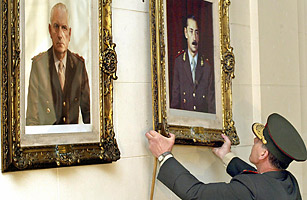
Latin America was a front line of the Cold War. Concerned that the world's most unequal continent would fall sway to the communist message of Fidel Castro, US Secretary of State Henry Kissinger told an incoming Argentine military dictatorship in 1976, "If there are things that have to be done, you should do them quickly." Dr. Kissinger was referring to the campaign against suspected leftist terrorists, and the military junta proceeded with their disappearance campaign. During the junta's seven-year reign, an estimated 30,000 people were thrown alive from a plane or buried anonymously. Amnesty for the military leaders came to an end during the presidency of Nestor Kirchner (2003-7), who went so far as to remove the official portraits of the military leaders (above). The official day of apology and memory for the disappeared took place on March 24, 2004 in Buenos Aires. That date has since been made a national holiday to commemorate the anniversary of the original coup d'etat.